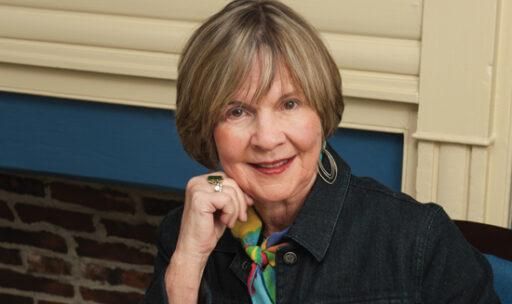We recently spoke with author Jeanne Murray Walker about her memoir, Leaping from the Burning Train.
Thanks in part to the alliance between Protestant fundamentalism and evangelicalism with certain forms of political populism, we’ve seen a lot of recent memoirs from angry, arguably self-righteous “Ex-vangelicals.” But the story of your journey out of fundamentalism isn’t angry or condescending. How did you resist the temptation to look down on your roots?
It would be one thing if the people in my fundamentalist church had been punitive or cruel, but they were good-natured and warm. They swapped recipes for green bean hot dishes and lemon meringue pie. They complimented one another’s cooking. They would clean one another’s houses and take care of one another’s children when there was a need. We were close, like the people in a besieged town that had closed its gates, rationed its water, and shared its candles.
Our family desperately needed that sort of closeness and stability. My father died after a long illness when I was thirteen and my brother, Michael, dropped dead suddenly three years later, during his first week of college. It seemed to me then that the world was rocking on its foundations and about to crack in half. But fundamentalism is, among other things, about defying change. I often saw plaques hanging on the walls of my friends reading, JESUS, THE SAME YESTERDAY, TODAY, TOMORROW. And our fundamentalist friends took our family to their hearts and did what they could to comfort us.
How could I remember so keenly the sense of love and belonging I felt with those people in my old Baptist church and write about them with condescension?
Are there aspects of the fundamentalist subculture that you miss—that you wish might be more present in other sectors of the religious community?
Yes. I miss the very close community that I believe we all felt when my family and other families in our conservative Baptist church saw one another as special and bonded. We counted on one another. Whenever the pastor turned the lights on, we were there: Sunday School, church, prayer meeting, young peoples’ meetings, vacation Bible school, mother-daughter banquets, midnight watches, potlucks, revivals, and car washes on Sunday afternoons.
Then my family and several others started a small Christian school where we memorized Bible verses from the King James translation, word-for-word. Where we sang together and enjoyed plenty of good fun. We teenaged girls rigged up a prayer room in the basement with a table, chairs, and a light which fell dramatically on a cross made of twigs held together by a rubber band. That’s where we talked through our differences and made up with one another after gossip and fights. We were constantly reminded by our teachers and parents that we were not like the “world” because we were children of God. In truth, we kids were more like an extended family than like school chums. We knew each other’s parents from sleepovers and frequent all-school meetings. We wrote and performed plays for the lower grades. We reveled in close academic competition and games.
To leave that close fundamentalist community felt both inevitable and shocking to me.
Eventually the metaphorical language of the Bible itself persuaded me that to make sense it needed to be read in a less literal way than I had been taught to read it. Shortly after, I joined an Episcopal church. At first that seemed as foreign as an African ritual.
I stayed and now I know that my Episcopal church is a community, too. But here’s the difference: after every Sunday morning service at St. Mary’s Episcopal Church our deacon proclaims: “Our worship has ended. Now our service has begun.” So the liturgy itself turns us away from focusing incessantly on our community. It reorients us to face the work and opportunities outside our group. Work that requires courage.
Your journey was not only a spiritual one but also a literary one—from literalism to a metaphorical way of seeing the world. Did the richness of the language of the King James Bible offer you something of a path toward your literary vocation?
Absolutely. Think of the Psalms. Or Proverbs. And then there’s the beautiful and heart-breaking Revelation of St. John. It felt frustrating not to be able to unlock the meaning of the Bible, which is, among other things, the greatest of metaphorical texts. Before I knew it, I found myself studying English—that is, how to read—in graduate school.
What drew you to poetry?
Poetry chose me. It drew me from the beginning. A few years ago, I found on my mother’s bookshelves a big navy blue book of nursery rhymes with illustrations. The cloth cover looked worn out from being read so often, to me and my siblings, presumably. I opened it and recognized its rhymes and its black and white 1950s illustrations immediately, as if they were my own back yard. I would like to say that book taught me to love poetry.
A good poem is often puzzling because it strips language down to its most efficient form. I liked that, the way a good poem gets to the point. It wastes no words. And it thrusts images onto the reader, images like a raven or a road on a dark night. And because of its repetitions and sound devices (i.e. rhyme, alliteration) a poem hangs on. It gets its hooks into you. A good poem, after you’ve read it, is hard to shake.
You’ve gone on to work in multiple genres, including one that fundamentalists traditionally have abhorred—playwriting. What does the “false” or “pretend” world of theater have to offer people of faith?
The theater is even more radical than poetry or prose. Poetry and prose at least restrain themselves to the page. They just suggest images by using language. But in the theater people and things appear on stage as if they are what they are not.
When I was growing up, my fundamentalist people did not approve of theater. I never saw a play, except a school performance, till I was eighteen. Back in 1642, before there were theaters in America, the Puritans, forebears of the fundamentalists, succeeded in closing the London theaters. It was only in the mid nineteen-sixties that children of fundamentalists in America began writing and acting in plays in religious colleges where they were meeting one another, and then bravely opening theaters around the country. Some of these are now among the best regional houses in America. Till then, one of the strongest taboos of fundamentalism was the taboo against theater.
The Puritans brought two charges against actors: they are sexually promiscuous, and they lie. Let actors stage a play in a church, the Puritans would still call it wicked, because actors speak fictional lines. Sir Philip Sidney countered this kind of attack by arguing that the theater reveals a vision more sweeping and true than anything that happens in real life. Who cares whether there was ever a person named Macbeth who coveted the throne of Scotland? Macbeth is true, not because its facts are historically accurate, but because the play shows what happens to someone who is governed by ambition.
What advice would you offer to a young or emerging writer of faith, someone who wants to communicate their religious experience but do so in a way that can be appreciated by anyone, regardless of their personal beliefs?
I have several suggestions.
One is this: read everything you can get your hands on. Bus schedules, milk cartons, billboards, hymn books, what’s on the best seller list, the Bible, the great poems in English and/or whatever languages you can understand. Read the law. Read how-to manuals. Read about the history and development of English and read old novels. Especially read Shakespeare. As you read, figure out what you like, what you don’t like. Use the stuff you like as models for your own writing. Find some writers that you can follow. They will be your mentors. Read everything they write.
If you want to write about questions of faith, read contemporary writers of faith. I’d recommend two contemporary volumes. Christian Poetry in America Since 1940: An Anthology and Jill Baumgaertner’s wonderful Taking Root in the Heart And don’t forget to read the older poets like John Donne and George Herbert. They’re difficult but they repay careful attention.
Two, look around to find other young writers you can workshop with. Universities often invite good writers to fly in and do readings for the public. If you live close to a college or university, check their visiting writer schedules and go to the events. After such events they often have receptions. Attend those, no matter how scary they seem. Find other writers there you can get to know.
Finally, when you get to know other writers, band together and form a workshop of four to six people which meets, say, every two weeks on Tuesday night. In the workshop each member brings a piece of writing with enough copies for all the members. Decide how many minutes to spend on each piece. Read each contribution aloud and while the author keeps mum, each member of the group can make comments, starting with what, if any, part of the piece they don’t understand and moving on to praise what works. You will help one another learn what works and what doesn’t.





